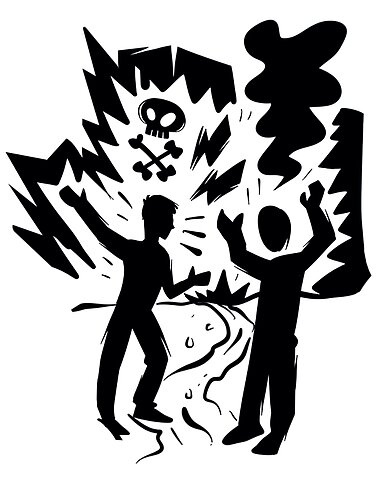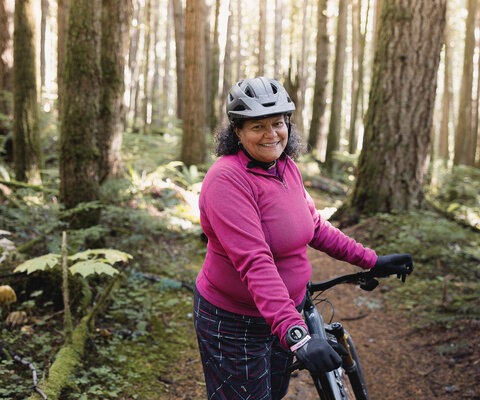
Ride or Divide Finding One Reality on Trail
Words by Matt Coté | Photos by Victor Brousseaud
He thinks I’m crazy, and I think he is too.
For him, economic growth is more important than climate action, and the COVID-19 lockdown measures were the most disastrous infringement on civil liberties in modern history. To me, there’s nothing for the economy to exist in without the climate, and the pandemic response was the greatest expression of the social contract since World War II. He thinks the market is self-equalizing and we need to get out of its way. I believe that, if left unchecked, free-market forces create the kind of drastic social inequities that are fraying Western democracies right now. And pronouns? Well, let’s not get into pronouns.
I find my libertarian friend challenging. There is a gulf between our politics: ideas that have become religious dogmas in our rage-filled world. And yet, when we’re on our bikes, those clashes disappear. In those moments, we don’t experience our beliefs, we experience our values. And that’s an entirely different way to know each other.
We agree that the earth beneath our tires is the biggest bounty in history. That bikes are the greatest invention humankind has ever mustered. And that riding them as fast as we can down mountains is the highest calling either of us has ever felt. We’re in sync about what makes good trails, that mullets rule, and that there are basic tenets of civility we should each hold to. We share a sardonic sense of humor, and the conviction that everything ought to be filtered through it—whenever possible, while riding.
My friend is a patient coach, generous with his technical knowledge, and inspires me to ride harder. He’s reliably always up for a pedal, and never without a smile. He insists friendliness is a virtue, and for all my progressive posturing, puts my dour constitution to shame with how sweet he is—to everyone.
In those moments, we don’t experience our beliefs, we experience our values. And that’s an entirely different way to know each other.
I’m embarrassed to admit I would not know any of this if we didn’t ride together, because I never would have gotten past his politics. Our friendship is possible because bikes gave us a better way to start, which makes perfect sense when you consider the long human history of people coming together over sport.
Like in 1971, when a U.S. ping-pong player missed his bus during the World Table Tennis Championships in Japan, and was invited by a Chinese player to ride with him. The two became friends and the Chinese team invited the U.S. to play exhibition games in China. The estranged countries got to know each other for the first time in a generation as each watched. By 1972, Richard Nixon traveled to Shanghai to re-establish diplomatic ties that had been cut off since 1949. All because a couple of pretty different dudes liked ping-pong.
Sports diplomacy, as this is often called, is one of the organizing ideas of the Olympics— games that, since 1896, have strived for global “unity in diversity.” That’s all very high-minded, and the International Olympic Committee makes questionable decisions a lot, but by and large it has succeeded over the years. South and North Korea even came together in 2018 to compete as one country, because physical activity is a universal language spoken across nearly every culture and ideology.
But you don’t have to be a nation state to get in on this trick. It works even on an individual level. As recently as 2023, a study in the journal Human Brain Mapping found that just 30 minutes on a bike lights up parts of our frontal cortexes associated with positive interactions, and improves “interpersonal cooperation behavior.”

Of course, that’s no surprise. We’ve long known exercise balances our hormones and calms our bodies. But there’s more than just brain chemistry at work here. When we ride, there is a shared heritage of tangible reality we cannot disagree on: the heat, moisture, shade, dust, obstacles, and contours of the trail in front of us. A bicycle can bring us to what not much else seems to be able to right now—common ground. From that place, the din of the everyday disappears, and we need not shout across vast expanses in frustrated fits to reach each other.
So who knows, maybe innovation does suffer under regulation. Maybe some parts of trickle-down economics do work. And maybe poverty is a personal problem we shouldn’t have to pay for as a society. I personally don’t think so, but for me the thought experiment presents a much more prescient idea—that maybe our opinions about these points don’t have to frame how we relate to one another. Perhaps we are not the sum of what we think, but the sum of how we act, and the importance we place on the differences between us is up to us.
Meanwhile, the mood around us right now works hard to convince us otherwise. Especially on the internet, and especially in our sport, where online forums revel in toxic mansplainy snark—the disembodied manifestation of pure, anonymous grievance feeding on itself for no particular reason. But, our real-world bodies are ready to override that signal if we take the time to actually get on a trail and tune into what’s tacit. That’s where community really happens.
As mountain bikers, we are all risk-takers: weirdos hurling down rocky precipices for recreation. In a time when we need to talk to each other more than ever, but it feels risky to do so, who’s better equipped than us? We’ve made an entire culture out of colliding with trees and boulders, surely we can graze up against different worldviews. Moreover, we should be able to thrive in that discourse. After all, we live for gravity and friction.
There are limits, obviously. I’m not going to go hit dirt jumps with a Nazi. But if someone believes in small government, fuckin’ eh I’ll still take a tow in. And by the time politics comes up, if it even does, I’ll be in a better place to hear that person and have them hear me. Because it’ll be too late to divide us—we’ll already be friends.




